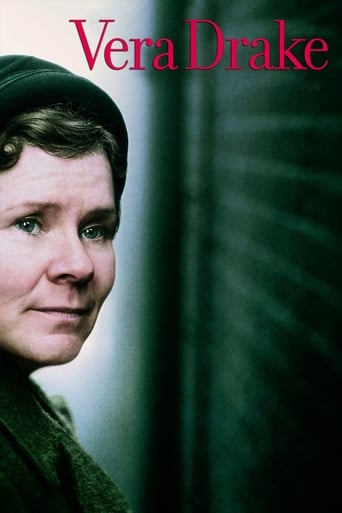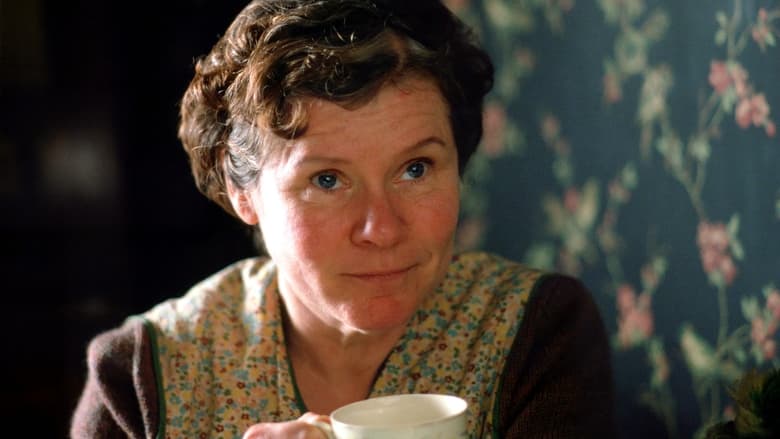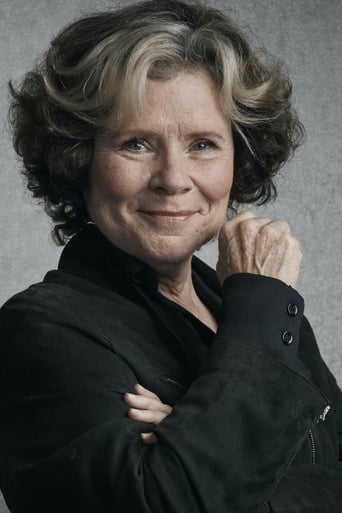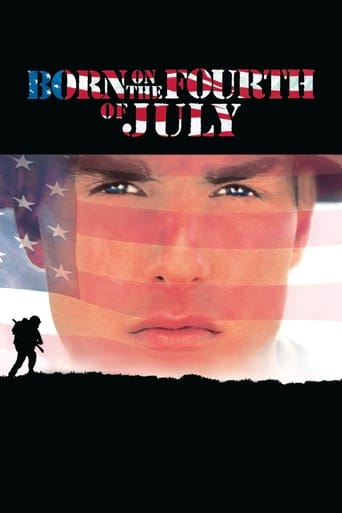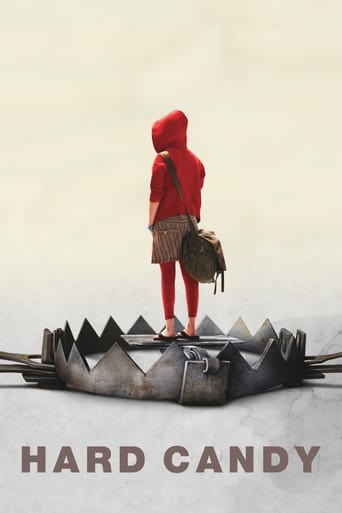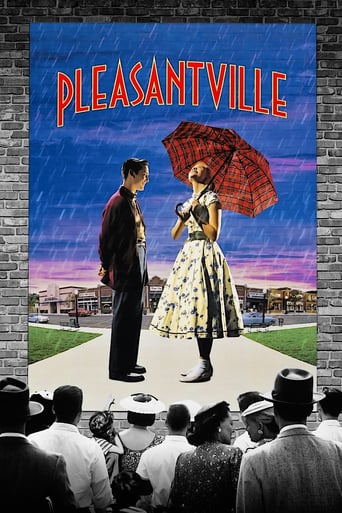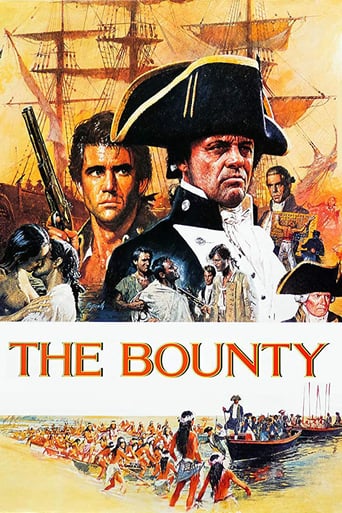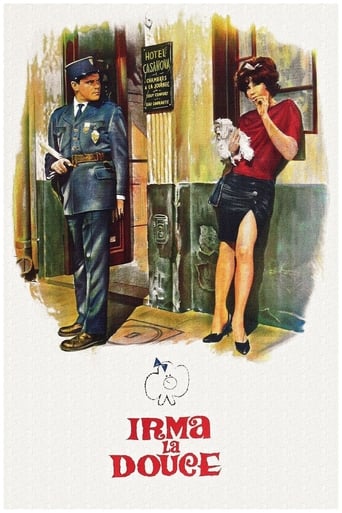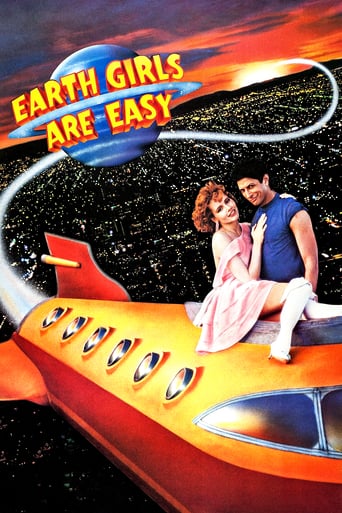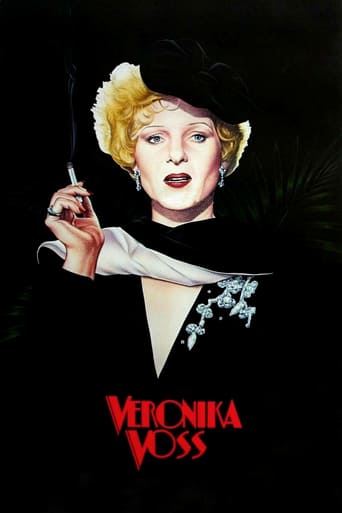Vera Drake (2004)
Abortionist Vera Drake finds her beliefs and practices clash with the mores of 1950s Britain – a conflict that leads to tragedy for her family.
Watch Trailer
Cast


Similar titles
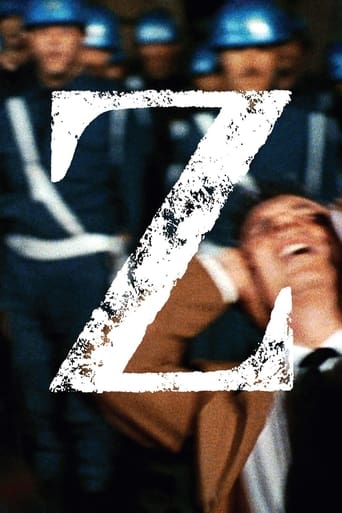
Reviews
Abortions have never been done the way they are presented in this movie with any lasting regularity, and certainly not by the same person, over and over. Doing an abortion using the method portrayed in this movie causes internal bleeding and death, almost 95% of the time-watch Revolutionary Road. Vera Drake would have killed hundreds of women. Surgical abortions have been taking place since the 1800s. Traveling abortionists were almost always male. No one in the world does abortions for free. It's a money game-always has been. Period. This movie is false from top to bottom. Perhaps it makes people "feel good" because of the pro-choice message, but it's false and totally inaccurate. I only gave it more than one star because the acting was good.
British realist director Mike Leigh's 2004 drama 'Vera Drake' focuses on the story of its title character (Imelda Staunton), a working class woman performing backstreet abortions in postwar London. Following the pseudo-documentary works of British New Wave filmmakers Ken Loach or Lindsay Anderson, Leigh delivers a social drama offering an insight on the medical, financial and domestic circumstances of working class families in 1950s England, using objective camera-work and a screenplay based on unscripted actor improvisation in order to create a film that is able to present a fragment of reality.At the end of his article on Vittorio De Sica's neorealist classic 'Bicycle Thieves' French film theorist André Bazin (famous for praising photography and cinema for being a superior art form being able to capture reality without the creative intervention of man) described the film as 'one of the first examples of pure cinema, no more actors, no more story, no more sets, which is to say that in the perfect aesthetic illusion of reality there is no more cinema.' Italian neorealism seems to be a key movement in the historical context of realism indeed. Its successful use of general atmosphere, authenticity, on-location settings and social/political context inspired filmmakers and was followed by cultural movements such as the French New Wave (example: Jean-Luc Godard's 1960 'Breathless'), the 'angry young men' of the British Kitchen sink realism (Tony Richardson's 1962 'The Loneliness of the Long Distance Runner') and the Danish avant- garde Dogme 95 (Lars von Tier's 1998 'Idiots'). More recent examples could be Asghar Farhadi's 'A Separation' or Cristian Mungiu's '4 Months 3 Weeks 2 Days' (the latter touching on the subject of illegal abortions as well). Descendant of postwar British realism, Mike Leigh is a consistent filmmaker commenting on the subjects of poverty, alienation, social gaps or rootlessness. Golden Lion winning and Academy Award nominated 'Vera Drake' might just be his most powerful film.Vera Drake, a feminist 'neo kitchen sink' film focuses on protagonist Vera Drake – 'wife, mother, criminal', as the poster of the film says -, a cheerful middle-aged lady working as a cleaner, who takes care of her family and her infirm mother and generally tries to help people. This is her motivation for being a back-alley abortionist, which she doesn't make a profit off – she wants to help. In spite of her intentions, after one of her patients nearly dies due to medical complications, she is found out about and has to face court, being sentenced to a minimum of 18 months in prison. What makes Leigh's morally controversial story realistic is his process of creating the characters with the actors through improvisation. One of the most memorable scenes of a family dinner interrupted by the appearance of the police is a great example to explain Leigh's method. During months of character research, discussion and improvisation the actors of the film are only aware of their own character's perspective and knowledge of a situation. The Drake family celebrate the engagement of Vera's unsociable daughter Ethel to the similarly withdrawn bachelor, Reg. Frank, brother of Vera's husband Stan announces that his wife is pregnant. Vera jumps up from her chair to congratulate the couple. As the result of the improvisation (which the final screenplay is based on) the actors are able to give honest performances, getting as close to their characters' emotions and thoughts as possible. The long, static takes and objective compositions give space for informal crosstalk and natural behaviour. Similarly the final scenes of character confessions in Leigh's 'Secrets & Lies', the appearance of the policemen suddenly surprises the family members. As actress Imelda Staunton remembers the rehearsals: 'That whole scene is the result of a seven and a half hour improvisation, where I didn't know the police were coming, so I nearly had a heart attack.' As the family knows nothing of Vera's illegal activities, her despair is grounded. A close-up of her face expresses shock and fear. (Bazin would possibly find Leigh's occasional use of subjective shots manipulative because they violate the continuity of dramatic space. But then again, his ideal would have been a film lacking montage, a concept only Alexander Sokurov's 2002 'Russian Ark' was capable of adapting.) In her fear Vera goes silent and hardly talks in the rest of the film – when she does, she whispers. While the detective inspector seems to understand her situation, she is still forced to answer explicitly to the questions concerning her 'job'. Her unconscious barrier between the abortions and herself is violated – she has to acknowledge her crime, an otherwise suppressed thought as earlier in the film she is shown unwilling to offer any emotional help for her patients, trying to leave the room as soon as possible, with the same routine sentences and advising a cup of tea every time. Her attitude towards abortion itself is the same as it is towards cleaning or cooking, a task she desperately tries to finish without emotional attachment.Although Vera Drake relies on external circumstances more than earlier Mike Leigh movies, it succeeds in painting an honest picture not only on the different views on such a controversial subjects as social class differences or abortion itself, but on human relationships and behaviour too. Leigh's naturalistic dialogues, unobtrusive cinematography and historically accurate mise- en-scéne supports the story about a woman losing her battle against society – either if she is right or wrong. Similarly to the protagonist of Bicycle Thieves left alone without any hope, the broken figure of Vera Drake climbing up the prison stairs is a tragic hero. Her tragic story, similarly, captures true realism.
Imelda Staunton is "Vera Drake" in this 2004 film by Mike Leigh, a real master of storytelling and character studies.The film is set in 1950, and times are still tough in England. Vera lives with her husband and two children in a tiny apartment and cleans houses for a living. She is there to lend a helping hand to anyone who needs one, besides caring for her mother. Vera also has a sideline no one in her family knows anything about. She performs illegal abortions.To Vera, this is just another way to help people. She doesn't take money, though the woman who refers her is taking plenty, without Vera's knowledge. Unfortunately, one of the young women becomes terribly ill and the doctor, realizing what happened, insists that the police are called. During the celebration of her daughter's engagement, Vera is arrested.In a subplot, we're shown how the rich deal with unwanted pregnancies - as long as you have the money and a psychiatrist will say you'll commit suicide if forced to give birth, it can be done in a clean hospital by a doctor. Vera's patients can't afford this.There's not much else to say about the story except that Imelda Staunton gives a sensational performance as Vera - the shock, the crying, the inability to speak up in court, the terror, it all rings true. Though something like 48 when she made this film, Staunton is every bit an older lady who has had a hard life, a gentle soul who loves people, loves her family, and is always there for everyone. Staunton is believable in every aspect, totally inhabiting Vera. She was nominated for an Oscar for her performance. It was a tough year; she lost to the Song of Bernadette performance of Hillary Swank in Million Dollar Baby. Very hard to beat that type of role.Highly recommended - Mike Leigh is a fabulous director and he always has a top-notch cast.
Why don't you "Put the kettle on" on and read this review of director Mike Leigh's 2004 drama that is very engaging and very British. He won numerous awards along with actress Imelda Staunton, while also being nominated for dozens more.Taking place in early 1950s London, Staunton gives a jolly good performance in a career defining role as Vera Drake, a woman who "helps" out other women who can't manage. This helping involves performing illegal abortions. Before you start judging her, we see her as the absolute model of perfection. She cleans houses, cares for her elderly mother as well as her own family. She has a husband and two grown children (Ethel and Sid) who all live in a cramped flat with barley enough room to turn around. Vera is so kind, loving and generous you are reminded of Mary Poppins. Repressed childhood trauma and a need to help people led her down this path.She has done this for many years and has never taken any money for doing it. Her long time friend Susan brings her the address of a woman in need and Vera arrives with her bag of tools. "First thing we do is put the kettle on". We see Vera visit a number of women all of whom deal differently with their situation. Some are doing it for the first time, while some are disturbingly use to it. Vera rationalizes her actions by feeling she is doing good and helping women at the most dire hour.When a young girl becomes ill and needs to be hospitalized, Vera's life and spotless reputation is about to be aborted as well. During her daughter's engagement dinner the police coming knocking, and Vera has a huge "oh sh*t" moment. The film then takes a strong emotional turn as her family has to deal with this secret life of hers. At the police station she admits to everything and signs a full confession. For the rest of the film Vera is in a state of shock and disbelief. Her bail is posted but her family life will never be the same. Her son Sid is disgusted by what she has done and refuses to be in the same room with her, while her daughter is sheepish but supportive. Her husband is torn and bewildered but remains supportive as well. This brings us to a very awkward Christmas celebration in contrast to the very joyful and lively engagement party from earlier (before the police crashed it). Vera eventually goes on trial and is sentenced.Although she does perform these abortions Vera is not a monster, she is not a leftist radical. She is a sympathetic mother of mercy to countless women. Because of the subject matter this film will no doubt divide people but the character of Vera Drake is one to remember.In recent years Imelda Staunton can be seen playing Dolores Umbridge in the Harry Potter movies.

